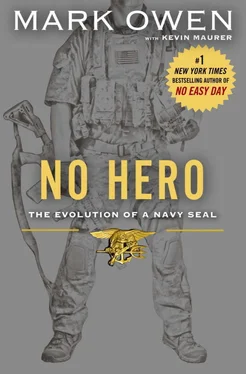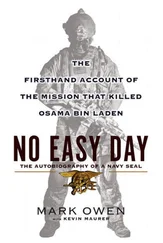I turned away and started to search the house. I saw a doorway just off the foyer and stepped through it. It led to a small hallway, and I walked through it into the kitchen.
Pots were stacked on the counter in haphazard piles. The whole room smelled of cooking oil and spices. A hole in the ground for the cooking stove was positioned in one corner. I started to move the pots, looking for weapons or anything left by the fighters. The area was secure, so I wasn’t quiet. I was digging through a cabinet near the door when I heard something behind me.
It sounded like a sob or a whimper.
I swung around, one hand on the grip of my rifle, and saw a small child huddled in the corner. He was balled up behind a pile of blankets, and my teammates must have missed him in the initial clearance. I squatted down to get a better look at him. I wasn’t sure if he was injured. His hair was matted. His tears washed away some of the dirt from his cheeks. He looked as ratty as the cat licking blood in the foyer.
I looked back over my shoulder and realized that from his vantage point, he would have seen the man in the foyer as he was shot. I had no idea if the man was his father or just a fighter hiding in the house. Either way, he’d watched us shoot the guy and probably saw the cat licking the puddle of blood.
“Wow, I’ve seen some crazy shit, but this poor kid is going to be fucked up by this the rest of his life,” I thought.
The kid was shaking he was so scared. He probably thought we were going to kill him too. Plus, I figured with all of my guns and gear strapped to me, I looked pretty menacing.
The kid continued to quietly sob. I slowly slid a chemlight out of my vest and popped it. The stick slowly lit as I shook it, bathing the room in a green hue. I also slid out a Jolly Rancher and held it out to him. The kid wouldn’t look me in the eye at first.
I shook the chemlight.
“Hey, buddy,” I said. “I’m not going to hurt you.”
I knew he had no idea what I was saying. My only hope was he got my tone. Slowly, he looked up. He was sizing me up, trying to gauge if I was a threat. I tried to smile, but I knew in all my gear a smile wasn’t going to be enough.
He looked away and then quickly snatched the chemlight and candy. He didn’t eat the candy; instead he just clutched it in his hand. I got on the radio to figure out where we were consolidating all the women and kids. They were in a house not far away, so I stood up and waved at him to follow me.
He didn’t move at first.
“Come on, buddy,” I said. “I’ll take you over to the others.”
He didn’t understand me, so I took his hand and led him out of the house. I tried to block his view of the dead fighter and the cat, still licking at the pool of blood.
“That was fucked up,” I thought. “This kid couldn’t be older than five years old and he witnessed the whole thing.”
We walked through the village. I could hear a few of the women and kids sobbing when I got to the house. A teammate was at the door keeping watch. When the kid saw the other children and women, he let go of my hand and walked into the middle of the room. I didn’t linger. I had work to do and I knew the kid was safe now.
As I walked back to the house to continue my search, I could still picture the cat licking the blood, and the kid watching from across the room as the man’s head was blown off. But I quickly pushed the image out of my mind and resumed my search.
I didn’t have time to dwell on it. After missions, I blocked it out. I know some guys who make a big deal about killing. I’d shot people from long distances and shot people at point-blank range. But I always rationalized it this way: If I hadn’t shot the enemy, he would have killed one of my swim buddies or me. I didn’t need another explanation.
But that still didn’t make it easier when I got back home to the real world.
My first deployments were like drinking from a fire hose. I didn’t know the process; I didn’t know what to expect. But after thirteen deployments, I got really good at turning things on and off. I compartmentalized the stress and kept it out of my stateside life.
I remember driving home from our base immediately after returning from the Iraq deployment. There was traffic and I almost drove over the median to get around it. In the early days of the Iraq war, we ran cars off the road when Iraqi drivers got in our way. It was suicide to get stuck in traffic in Iraq. Car bombs were a constant threat. Sitting still made you a target. So we tried to keep moving at all times. We also kept other cars away from our convoy. We threw rocks at car windows, cracked windshields, and shot tires out.
But at home, we’re expected to forget everything we did to survive overseas. How did I leave it all over there? I don’t know. All I know was I got better and better at compartmentalizing things. I simply blocked out a lot of the emotional stuff. I pushed myself through the confusion of living one life overseas and another at home. It wasn’t easy.
I had to make a conscious decision to take control of my life. It was a struggle, one I overcame by redirecting many of the lessons I learned from SEAL training. I simply didn’t let the effects of combat control me. It was like the Las Vegas commercial: What happened in Afghanistan stayed in Afghanistan. When I came home I never talked about work to people outside of my teammates.
But after the mission, I couldn’t shake the stress. The mission was spilling out of my mental compartments. As I left the cage after talking to my buddy, I felt better. I felt reassured knowing that others were going through the same mental gymnastics as I was. I wasn’t the only one having trouble trying to comprehend all the shit that had gone on since the raid.
A few years earlier the Navy started trying to address combat stress. Their first idea was requiring us to spend a few extra days in Germany on the way home from every deployment. They wanted us to decompress. This was when post-traumatic stress disorder (PTSD) was in the news and officials were clamoring to find a remedy for the uptick in cases.
Before Germany, we’d be home sometimes twenty-four hours after an operation. I’d go from a gunfight overseas and within a day be back in the States at Taco Bell for my routine, two tacos and a bean burrito. It sounds pretty strange, but that stop at Taco Bell was probably me putting up a wall on another compartment in my brain; it allowed me to keep everything separate.
So after the policy change, we stopped in Germany and the command’s psychologist flew over to meet us and give us classes on coping with combat stress and reintegration into the civilian world. For the guys with families, the training was focused on going back to the family routine. The funny part was we’d be home for a few weeks, only to head out on our next training rotation, which would keep us on the road for weeks.
The whole Germany decompression idea eventually backfired. It pissed off our families and girlfriends because our deployments were now three days longer. Not to mention we all came home smelling like good German beer.
The command eventually replaced the Germany stop with a new policy. We all had to meet with a command psychologist. We were required to sit down for a single thirty-minute meeting after each deployment. The thirty minutes were used to talk about any issues we might be having. Once I went down with another buddy, Gerry, to knock it out. We weren’t buying into this, and it had become just another line item on my to-do list after returning from a deployment. Each person’s thirty-minute session had to be complete before they would allow us to take any leave or vacation time. It was something the senior guys blew off, but we were required to go. We knew it was a box that needed to be checked so the Navy could say we were being counseled and trained to deal with the stresses of combat.
Читать дальше










